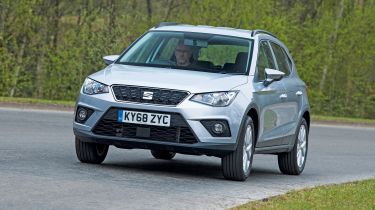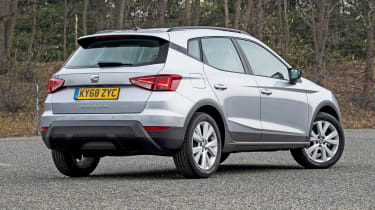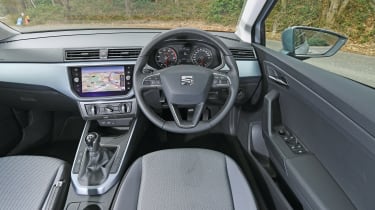Used SEAT Arona (Mk1, 2017-date) review
A full used buyer’s guide on the SEAT Arona covering the Arona Mk1 (2017-date)
Verdict
While it’s fair to say the SEAT Arona isn’t the most characterful compact SUV you can buy on the second-hand market, it does offer strong value for money against its rivals. Not only that, it’s also composed and refined on the road, with generous standard equipment. If you like its style and are not particularly concerned with practicality – other alternatives do better in this area – then it’s a perfectly sensible used compact SUV to go for.
When Nissan introduced the Juke in 2010, it was an obvious move. Superminis were the most popular type of car across Europe, and SUVs were increasingly sought-after. Combining the two segments made perfect sense, and sure enough, these mini-SUVs sold like hot cakes pretty much regardless of which badge was on the nose.
By the time SEAT got in on the act in 2017, many of its rivals had introduced mini-SUVs of their own; in the two years up to the Arona’s introduction, global sales of these smallest of crossovers had increased fourfold. Within four years of the Arona being introduced, SEAT had sold more than 350,000 of them, proving that it was the right decision for the Spanish brand – and buying one on the second-hand market could be a canny move on your part too.
Used - available now

2024 Seat
Arona
39,044 milesAutomaticPetrol1.0L
Cash £14,999
2025 Seat
Arona
5,750 milesManualPetrol1.0L
Cash £14,599
2024 Seat
Arona
17,956 milesManualPetrol1.0L
Cash £15,649
2025 Seat
Arona
27,575 milesManualPetrol1.0L
Cash £13,149Models covered
SEAT Arona (2017-date) - This Spanish SUV is good value and easy to live with, making it well worth a look.
History
The Arona reached the UK in November 2017, with buyers able to choose between a 1.0 TSI petrol engine and a 1.6 TDI diesel. Both were offered with 94bhp or 114bhp, but whereas the only TSI engine to come in DSG dual-clutch automatic form was the high-powered version, only the lower-powered diesel was offered with this transmission.
For those who wanted more power, there was a 148bhp 1.5 TSI Evo petrol engine; initially this came only with a manual gearbox, but from October 2020 this could also be specified with a seven-speed DSG transmission. A refreshed Arona range arrived in July 2021, with a choice of 1.0 TSI (now in 94bhp and 109bhp forms) and 148bhp 1.5 TSI petrol engines, but there was no longer a diesel option.
Which one should I buy?
The TSI and TDI units are all decent choices, with the latter giving an impressive balance of economy and performance, although they’re a little noisy. The manual and DSG automatic transmissions are all nice enough to use, too, so we wouldn’t avoid any set-up.
We also wouldn’t steer you away from any of the trim levels, because all Aronas are well equipped. The entry-level SE comes with 17-inch alloys, Bluetooth, a DAB radio, automatic headlights, Apple CarPlay and Android Auto, air-con and cruise control.
SE Technology adds rear parking sensors and navigation, while the SE Technology Lux also has heated front seats, adaptive cruise control and an upgraded hi-fi. The FR gets privacy glass, electrically folding door mirrors, LED headlights, sports seats and dual-zone climate control. The FR Sport has 18-inch wheels and Alcantara trim.
Alternatives to the SEAT Arona
The Volkswagen T-Cross and Skoda Kamiq are closely related to the Arona, so they offer much the same in terms of equipment, running gear and usability. Two other rivals that are related to each other are the Kia Niro and Hyundai Kona which, unlike the Arona, are available in electric and plug-in hybrid forms. Kia also offers the Stonic, but only in petrol and diesel forms.
The Nissan Juke is strong value, just like its cousin, the Renault Captur, while the Ford Puma is great to drive and affordable too. The Mazda CX-3 is dynamically impressive, has a great interior and looks smart, while the Citroen C3 Aircross is distinctive, just like the Peugeot 2008, which has an excellent interior. Don’t overlook the Toyota C-HR, especially if you want a hybrid mini-SUV.
What to look for
Spare wheel
While some pre-facelift cars had a space saver, most Aronas came with a tyre mobility kit. You can buy a space saver for £230.
Safety
A few owners have had problems with the Front Assist system. Sometimes it’s a faulty sensor and other times it’s down to bad weather.
Noises
Rattling from the passenger side of the dashboard is a problem that’s not unheard of. Tracking down the source of this isn’t easy.
Comfort
Ride quality is goodon most Aronas with 17-inch wheels. FR and FR Sport models are fitted with stiffer suspension and bigger wheels, though.
Common faults
When the Arona came 39th in the 2021 Driver Power new-car survey, it had a below-average score in the reliability and build quality category. Be sure to check the service and MoT history of any used Aronas you look at before buying.
Interior
The design of the Arona’s interior is unlikely to excite you, but you will like how easy it is to find everything, with the well laid-out dashboard featuring ultra-clear instrumentation.
Seat comfort is marked down by owners, as is rear-seat legroom, although there’s no shortage of headroom. Boot space isn’t the best, at 400 litres, but this jumps to 823 litres (to the window line rather than the roof) with the seats folded down.
All post-facelift Aronas, apart from the SE model, come with a 9.2-inch infotainment touchscreen. It has clear graphics and is easy to use, and features Android Auto and wireless Apple CarPlay.
Running costs
Arona owners can choose fixed or variable servicing schedules, although the latter is the default option. The fixed regime means annual maintenance (with a 9,300-mile limit), and the work runs on a three-year cycle: oil change, intermediate service, then a major service.
The variable scheme combines the first two of these services, so it’s due after 18,600 miles or two years, but the following year (or after 37,500 miles) a major service is still due. A first-year service is priced at £215, while the second-year service is £269; a minor service costs £189, and the major is pegged at £319.
The diesel engine has a cambelt that should be replaced every five years or 130,000 miles, at a cost of £419; the cambelts on TSI engines don’t have a set schedule, but should be checked at each service and replaced at a cost of £499, if necessary.
Recalls
THE Arona has been recalled four times so far. The first campaign was launched by SEAT back in November 2018 because one of the rear seatbelt buckles could fail to latch properly. The solution to this problem was to fit a spacer to the buckle, making it work correctly.
The next recall came in February 2019, because the parking brake could go out of adjustment. Dealers had to fit a locking nut to keep things tightened up in this instance.
A replacement driver’s airbag had to be fitted to some Aronas that were recalled in May 2019, because they weren’t inflating quickly enough in the event of an impact. The most recent recall was issued in April 2020, because once again there were problems with the double seatbelt buckle for those in the rear. This time the fix was to replace the buckle altogether.
Driver Power owner satisfaction
A 39th place (out of 75 cars) in the 2021 Driver Power new-car survey isn’t bad, after a 22nd place last year and 17th in 2019. The Arona did well overall, but owners weren’t keen on the interior design, or the shortage of versatility and boot space, plus there isn’t enough rear-seat legroom. But the safety features and low running costs got a big thumbs up, as did the value, performance and the user-friendly infotainment.








